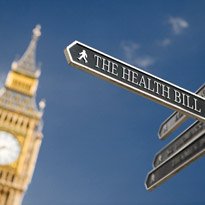GPC warns on ‘privatised’ commissioning
- 1 March 2012

The BMA General Practitioner’s Committee is the latest body to come out against the Health and Social Care Bill, although it wants to retain clinically-led commissioning.
One of the many concerns about the bill that the GPC outlines in a letter to doctors in England is the potential for private organisations to end up running the ‘back office functions’ of clinical commissioning groups.
The committee has previously argued that if IT, information and analysis services are outsourced, private provid ers could end up having undue influence over CCGs.
“Unless GPs take an active stand, the day to day running of the CCG, and especially its commissioning function, is likely to be outsourced to the hands of organisations providing commissioning support services,” the letter says.
“CSSs will be required to be outside the NHS as ’freestanding enterprises’, and in a market of commissioning support for CCGs as ’customers’, by 2016 at the latest [and] we believe this will lead to the privatisation of commissioning.
“There is no good reason why CCGs, or groupings of them, could not run their own CSS, within the NHS, and this is something we advocate.”
The GPC is a committee of the British Medical Association, which has already come out against the bill. However, the BMA only covers those doctors who are members, while the GPC represents all GPs in Great Britain.
The government’s reforms, which are intended to introduce more clinically led commissioning and a greater measure of competition to the NHS, were originally set out in the ‘Liberating the NHS’ white paper in 2008.
They have been stuck in Parliament for a year, and are currently before the House of Lords, which is working through hundreds of amendments tabled by the government, Liberal Democrats and Labour.
GPC chairman Dr Laurence Buckman says in today’s letter that the government should consider a “sensible alternative” to the bill that retains GP commissioning without the need for legislation.
Dr Buckman said it had become clear that “this is the most top-down reorganisation the NHS has seen since its inception."
He claimed “the ability for ordinary GPs to change things will diminish” under the reforms because guidance from the new NHS Commissioning Board was pushing them into “ever larger and more remote units.”
And he warned that CCGs were becoming the vehicles for turning the NHS into a competitive marketplace where services have to compete for their business and where patient care becomes “increasingly fragmented.”
There is also a danger that GPs could be blamed by their patients for having to close services for financial reasons, he added.
The BMA has been joined by most of the major royal medical colleges and the editors of England’s major health journals in opposing the bill, which is also facing opposition from GPs involved in the reforms.
The Tower Hamlets Clinical Commissioning Group recently became the first CCG to publicly oppose the bill in a letter to Prime Minister David Cameron.
The East London CCG is chaired by Dr Sam Everington, who is a keen advocate of reform, but believes the bill is not necessary to make it happen.
The Liberal Democrats are also increasingly uneasy about the bill. Activists are pressing for a vote on axing it at next week’s spring conference, even though leader and Deputy Prime Minister Nick Clegg has put forward changes that he hopes will reassure the party and allow the bill to proceed.
However, health secretary Andrew Lansley has insisted that the Lib Dems have "strengthened" the bill and that the reforms will proceed.
He told a Nuffield Trust conference yesterday that "often the things that doctors are worried about are not going to happen."
A BMA statement says it will be asking GPs to write to their MPs outlining their concerns ahead of the Bill returning to the House of Commons later this month.




